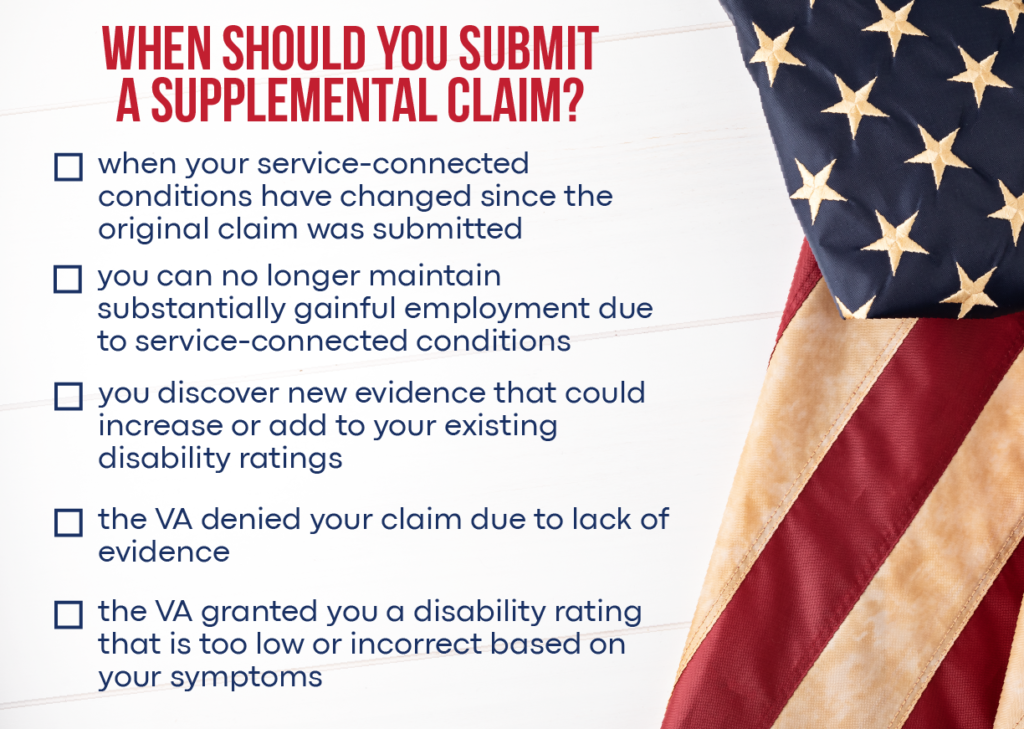If you are a veteran and have been denied benefits by the VA, filing a Supplemental Claim may be the best way to get additional support. Filing a successful supplemental claim can be complicated and time-consuming. Still, with the right approach and knowledge of how the VA adjudicates its claims, it is possible to win your case. This article will provide an overview of the filing process and offer tips on increasing your chances of success. Read on to find out how to file a winning VA supplemental claim.
What is a Supplemental Claim?
A supplemental claim is a request for increased VA disability benefits filed by veterans who have already applied for the same or similar benefits on the same or similar basis. To be considered, the veteran must provide additional evidence to support their application.
Veterans may submit a supplemental claim when they believe their service-connected conditions have changed since the original claim was submitted or when they can no longer maintain substantially gainful employment due to their service-connected conditions. Additionally, veterans can file supplemental claims when they have discovered new evidence that could increase their disability rating or add a new disability to their existing disability ratings.
When to File a VA Supplemental Claim

There are several situations when filing a supplemental claim may be the best course of action. If you have new evidence that could increase your disability rating, if your service-connected conditions have changed since the original claim was submitted, or if you can no longer maintain substantially gainful employment due to your service-connected disabilities, then submitting a supplemental claim is a viable option.
Additionally, if the VA has denied your claim due to lack of evidence or conflicting information, filing a supplemental claim can help you prove your case. Lastly, if the VA has granted a disability rating that you believe is too low or incorrect based on your symptoms, filing a supplemental claim is the best way to request an increase in your rating.
VA Supplemental Claim Lane

VA Supplemental Claim Lane allows veterans to submit new and relevant evidence for their previously denied claims. This evidence may include medical diagnoses, nexus opinions,
service personnel records, or lay evidence that can prove or disprove an issue related to the veteran’s claim.
Under this lane, VA must assist in gathering evidence, although they do not have this same responsibility under the Higher-Level Review process or in appeals to the Board.
All veterans must submit or inform the VA of new and relevant evidence to open a Supplemental Claim before the deadline for submitting additional evidence. The new standard for evidence now requires less evidence than the previous “new and material” standard used in the Legacy appeals system.
What should I include in my VA Supplemental Claim?

New and relevant evidence
When filing a VA Supplemental Claim, you must submit new and relevant evidence to the VA to meet its requirements. This means any evidence that is not included in your C-File records or was not part of the initial claim decision made by the VA.
One way to provide new and relevant evidence is to get a new independent medical opinion from a doctor. This can help you link your disability to your military service, as the doctor would examine all of the records in your VA file and provide an updated opinion.

Old evidence missing from C-File
You can also submit old evidence that is missing from your C-File. This could include medical records created decades ago that you noticed were not included in your C-File or any other paperwork related to your disability or military service.

New tests or medical examinations
Another way to provide new evidence is to get additional diagnostic tests like MRI scans or blood work. This can provide further evidence of your disability and help prove that it relates to your military service.

Write a personal statement.
Finally, you can submit a personal statement describing the current symptoms of your disability and how they affect your life today. This can provide the VA with an updated understanding of the impact of your disability on your daily life, and can be a great way to provide new evidence.
When filing a VA supplemental claim, it is important to understand what type of evidence the VA seeks and how you can provide it. Submitting the best evidence possible with your claim will help ensure success.
How to Fill Out VA Supplemental Claim Form 20-0995
The VA supplemental claim form, 20-0995, is used by disabled veterans to submit new and relevant evidence for previously denied claims. The form is broken into four sections:
1. Claimant’s identifying information:
This section requires veterans to provide personal information such as their name, Social Security number, date of birth, current mailing address, telephone number, and benefit type.
2. Issues for review:
In this section, claimants must list each issue decided by VA that they would like VA to review for the supplemental claim. The date of the decision notice in which disability benefits were denied or partially granted must also be included.
3. New and relevant evidence:
Here, claimants can submit or tell VA about any new and relevant evidence they have gathered, such as treatment records from VA medical centers. The name and location of the facility, along with the dates of the records, must be provided.
4. Certification and signature:
This section is mandatory, and completion is required for VA to process the supplemental claim. By signing, veterans confirm that all information the form provides is accurate.
How Long Does a VA Supplemental Claim Take?

The Supplemental Claim Lane is available to veterans who have received an unfavorable decision due to missing evidence. With this lane, veterans can submit new and relevant evidence to be
considered in reviewing their claims. Veterans may find that VA’s claim timeline for submitting a Supplemental Claim is roughly 60 days, with a goal of 125 days set by the VA to issue a decision.
Tips for Submitting a Strong VA Disability Claim

Submitting a strong VA disability claim can help ensure successful outcomes. Here are some tips for writing a winning supplemental claim:
Gather all of your medical records:
Gathering medical records from the past is essential for submitting a strong claim. VA will look for evidence that your condition is connected to military service, so having a comprehensive medical history will help.
Get an opinion from a doctor:
Getting a medical opinion from a doctor can go a long way in proving the severity of your disability. The doctor’s opinion will be considered when evaluating your claim, and having an official statement is much more helpful than relying on self-reported information.
Write a personal statement:
A personal statement can provide insight into the impact of your disability on your daily life and can be a great way to provide new evidence. Writing about how your disability affects you is key in helping VA understand the gravity of your situation.
Be thorough with forms:
When submitting your claim, ensure all forms are filled out completely and accurately. This will help ensure that your claim is processed efficiently and effectively.
By following these tips, you can ensure your VA supplemental claim is as strong as possible. Taking the time to provide all necessary information and documentation can be a key factor in obtaining disability benefits.

Common Questions and Answers About Filing a Supplemental Claim
1. What is a VA Supplemental Claim?
A VA supplemental claim requests the U.S. Department of Veterans Affairs (VA) to reconsider an initial decision made on a disability claim. It allows veterans to submit new and relevant evidence to demonstrate that their disability is connected to military service so that they can receive the benefits they deserve.
2. How successful are VA supplemental claims?
VA supplemental claims have a high success rate, depending on the strength of the evidence provided. By submitting new and relevant information to support your claim, you can greatly increase your chances of obtaining disability benefits.
3. What is considered new evidence for a VA supplemental claim?
New evidence for a VA supplemental claim can include medical records, doctor’s opinions, or personal statements documenting the connection between your disability and military service. Any information not already in the VA’s possession can be considered new evidence in a Supplemental Claim.
4. What is a Decision Review Request?
A decision review request (DRR) is an appeal to VA for an unfavorable decision on a disability claim. It allows veterans to ask VA to reconsider their decision and, if necessary, submit new evidence unavailable during the initial claim review.
Need Help with Filing a VA Disability Claim
If you have any questions about filing a VA supplemental claim, Vet Claim Solutions is here to help. Our experienced Vet Claim Coaches can provide guidance and advice on all aspects of the claims process, including gathering evidence and completing paperwork. We are committed to helping veterans get the VA benefits they deserve, so don’t hesitate to reach out for assistance.


